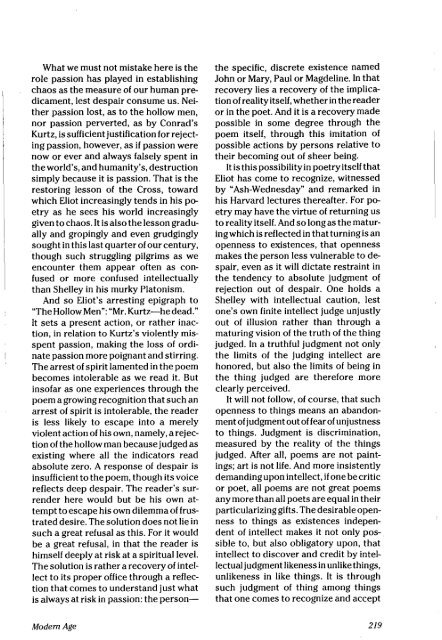T. S. Eliot Circa 1930: The Recovery of the Permanent Things
T. S. Eliot Circa 1930: The Recovery of the Permanent Things
T. S. Eliot Circa 1930: The Recovery of the Permanent Things
Create successful ePaper yourself
Turn your PDF publications into a flip-book with our unique Google optimized e-Paper software.
I<br />
What we must not mistake here is <strong>the</strong><br />
role passion has played in establishing<br />
chaos as <strong>the</strong> measure <strong>of</strong> our human pre-<br />
dicament, lest despair consume us. Nei-<br />
<strong>the</strong>r passion lost, as to <strong>the</strong> hollow men,<br />
nor passion perverted, as by Conrad’s<br />
Kurtz, is sufficient justification for reject-<br />
ing passion, however, as if passion were<br />
now or ever and always falsely spent in<br />
<strong>the</strong> world’s, and humanity’s, destruction<br />
simply because it is passion. That is <strong>the</strong><br />
restoring lesson <strong>of</strong> <strong>the</strong> Cross, toward<br />
which <strong>Eliot</strong> increasingly tends in his po-<br />
etry as he sees his world increasingly<br />
given to chaos. It is also <strong>the</strong> lesson gradu-<br />
ally and gropingly and even grudgingly<br />
sought in this last quarter <strong>of</strong> our century,<br />
though such struggling pilgrims as we<br />
encounter <strong>the</strong>m appear <strong>of</strong>ten as con-<br />
fused or more confused intellectually<br />
than Shelley in his murky Platonism.<br />
And so <strong>Eliot</strong>’s arresting epigraph to<br />
“<strong>The</strong> Hollow Men”: “Mr. Kurtz-he dead.”<br />
It sets a present action, or ra<strong>the</strong>r inac-<br />
tion, in relation to Kurtz’s violently mis-<br />
spent passion, making <strong>the</strong> loss <strong>of</strong> ordi-<br />
nate passion more poignant and stirring.<br />
<strong>The</strong> arrest <strong>of</strong> spirit lamented in <strong>the</strong> poem<br />
becomes intolerable as we read it. But<br />
ins<strong>of</strong>ar as one experiences through <strong>the</strong><br />
poem a growing recognition that such an<br />
arrest <strong>of</strong> spirit is intolerable, <strong>the</strong> reader<br />
is less likely to escape into a merely<br />
violent action <strong>of</strong> his own, namely, a rejec-<br />
tion <strong>of</strong> <strong>the</strong> hollow man because judged as<br />
existing where all <strong>the</strong> indicators read<br />
absolute zero. A response <strong>of</strong> despair is<br />
insufficient to <strong>the</strong> poem, though its voice<br />
reflects deep despair. <strong>The</strong> reader’s sur-<br />
render here would but be his own at-<br />
tempt to escape his own dilemma <strong>of</strong> frus-<br />
trated desire. <strong>The</strong> solution does not lie in<br />
such a great refusal as this. For it would<br />
be a great refusal, in that <strong>the</strong> reader is<br />
himself deeply at risk at a spiritual level.<br />
<strong>The</strong> solution is ra<strong>the</strong>r a recovery <strong>of</strong> intel-<br />
lect to its proper <strong>of</strong>fice through a reflec-<br />
tion that comes to understand just what<br />
is always at risk in passion: <strong>the</strong> person-<br />
<strong>the</strong> specific, discrete existence named<br />
John or Mary, Paul or Magdeline. In that<br />
recovery lies a recovery <strong>of</strong> <strong>the</strong> implica-<br />
tion <strong>of</strong> realityitself, whe<strong>the</strong>r in <strong>the</strong> reader<br />
or in <strong>the</strong> poet. And it is a recovery made<br />
possible in some degree through <strong>the</strong><br />
poem itself, through this imitation <strong>of</strong><br />
possible actions by persons relative to<br />
<strong>the</strong>ir becoming out <strong>of</strong> sheer being.<br />
It is this possibilityin poetryitself that<br />
<strong>Eliot</strong> has come to recognize, witnessed<br />
by “Ash-Wednesday’’ and remarked in<br />
his Harvard lectures <strong>the</strong>reafter. For po-<br />
etry may have <strong>the</strong> virtue <strong>of</strong> returning us<br />
to reality itself. And so long as <strong>the</strong> matur-<br />
ingwhich is reflected in that turning is an<br />
openness to existences, that openness<br />
makes <strong>the</strong> person less vulnerable to de-<br />
spair, even as it will dictate restraint in<br />
<strong>the</strong> tendency to absolute judgment <strong>of</strong><br />
rejection out <strong>of</strong> despair. One holds a<br />
Shelley with intellectual caution, lest<br />
one’s own finite intellect judge unjustly<br />
out <strong>of</strong> illusion ra<strong>the</strong>r than through a<br />
maturing vision <strong>of</strong> <strong>the</strong> truth <strong>of</strong> <strong>the</strong> thing<br />
judged. In a truthful judgment not only<br />
<strong>the</strong> limits <strong>of</strong> <strong>the</strong> judging intellect are<br />
honored, but also <strong>the</strong> limits <strong>of</strong> being in<br />
<strong>the</strong> thing judged are <strong>the</strong>refore more<br />
clearly perceived.<br />
It will not follow, <strong>of</strong> course, that such<br />
openness to things means an abandon-<br />
ment <strong>of</strong> judgment out <strong>of</strong> fear <strong>of</strong> unjustness<br />
to things. Judgment is discrimination,<br />
measured by <strong>the</strong> reality <strong>of</strong> <strong>the</strong> things<br />
judged. After all, poems are not paint-<br />
ings; art is not life. And more insistently<br />
demanding upon intellect, if one be critic<br />
or poet, all poems are not great poems<br />
anymore than all poets are equal in <strong>the</strong>ir<br />
particularizing gifts. <strong>The</strong> desirable open-<br />
ness to things as existences indepen-<br />
dent <strong>of</strong> intellect makes it not only pos-<br />
sible to, but also obligatory upon, that<br />
intellect to discover and credit by intel-<br />
lectual judgment likeness in unlike things,<br />
unlikeness in like things. It is through<br />
such judgment <strong>of</strong> thing among things<br />
that one comes to recognize and accept<br />
Modern Age 219
















